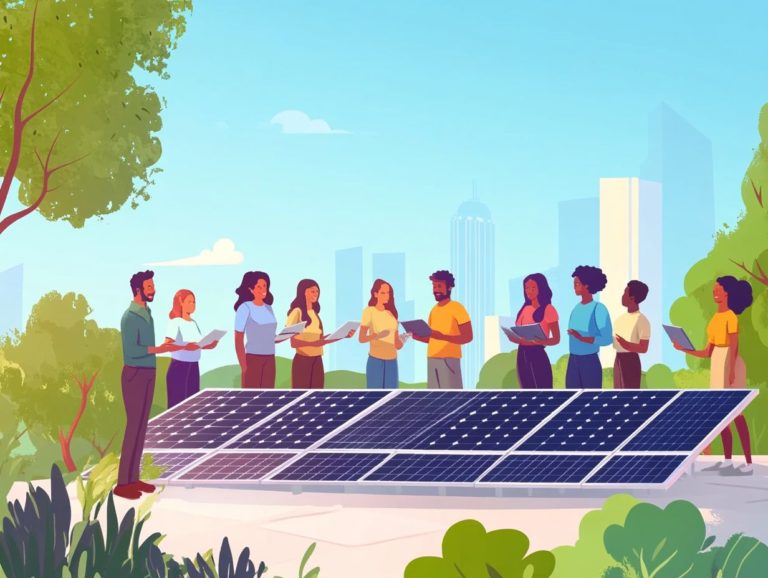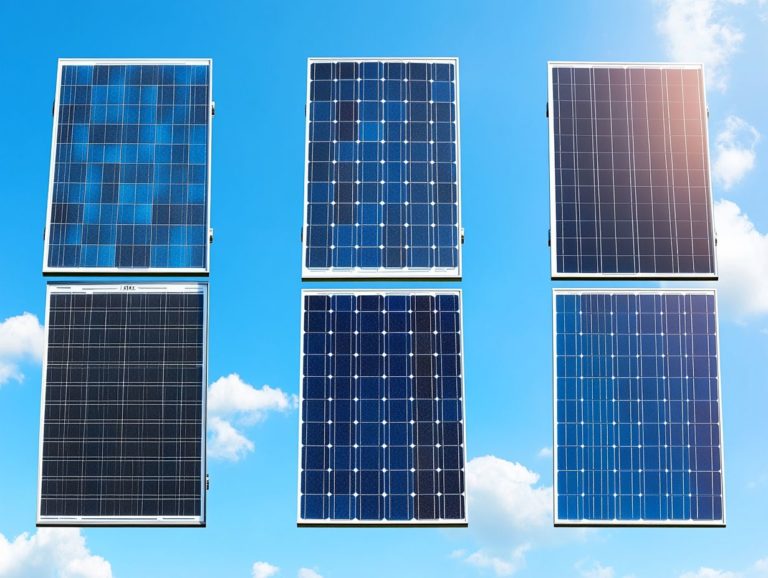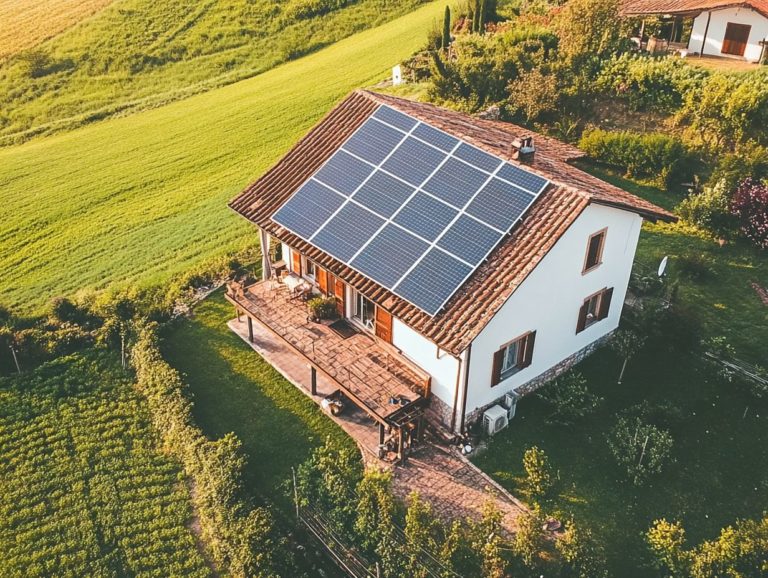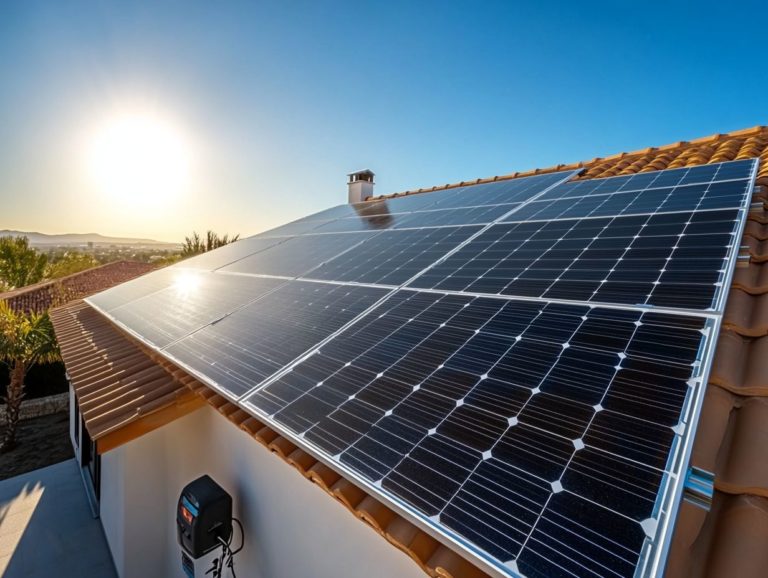“How to Maintain Your Solar Energy System”
Solar energy systems are becoming a preferred choice for eco-conscious homeowners and businesses seeking to harness the power of renewable energy.
Understanding the various types of solar energy systems, along with their benefits and maintenance requirements, is crucial for maximizing efficiency and ensuring long-term performance. This article delves into practical tips for regular cleaning and inspections, managing repairs, and tackling common issues.
Discover smart strategies to optimize your solar setup today!
Contents
- Key Takeaways:
- Understanding Solar Energy Systems
- Maintaining Your Solar Energy System
- Maximizing Efficiency
- Dealing with Potential Issues
- Ensuring Long-Term Performance
- Frequently Asked Questions
- 1. How do I know if my solar energy system needs maintenance?
- 2. What type of maintenance is required for a solar energy system?
- 3. Can I perform maintenance on my solar energy system myself?
- 4. How long does a solar energy system typically last?
- 5. Can extreme weather affect my solar energy system?
- 6. Are there any warranties for solar energy systems?
Key Takeaways:
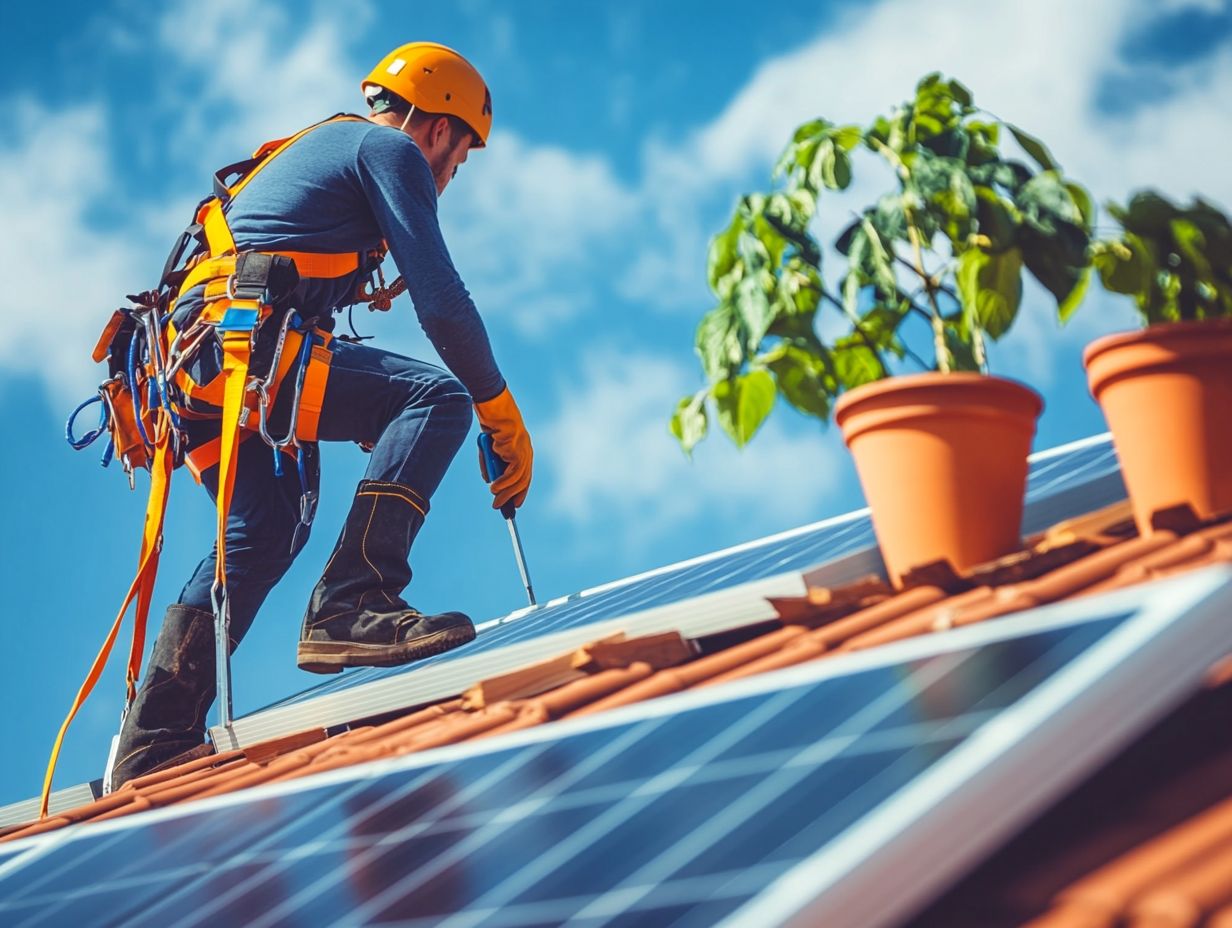
Regular cleaning and inspections are crucial for maintaining your solar energy system’s performance.
Addressing repairs and replacements in a timely manner can prevent potential issues and ensure the longevity of your solar energy system.
Optimizing your solar energy system through proper installation and maintenance can lead to increased efficiency and cost savings in the long run.
Understanding Solar Energy Systems
Understanding solar energy systems means grasping the intricacies of their various components, such as solar panels and solar batteries. These components work together with the electrical grid to deliver sustainable energy solutions.
Grid-tied systems connect directly to your local electricity provider. This allows you to sell back extra energy, which helps reduce your bills.
In today s eco-conscious world, solar energy technology stands out as a key player in reducing energy consumption and fostering energy independence.
Advancements in solar installation let you enjoy cost savings and reduce your carbon footprint. This enhances your experience as you efficiently harness the power of the sun.
Types of Solar Energy Systems
You have a variety of solar energy systems at your disposal, including grid-tied, off-grid, and hybrid options, each tailored to meet different energy needs and preferences.
Grid-tied systems allow you to take advantage of net metering, which lets you sell any excess energy back to the grid an excellent way to offset costs.
On the flip side, off-grid systems operate independently, utilizing batteries to store surplus energy for cloudy days or nighttime usage. This provides you with reliable power when you need it most.
If you prefer flexibility, hybrid systems combine both approaches, enabling you to draw energy from the grid and battery storage as needed.
By incorporating monitoring devices into your solar setup, you can significantly boost performance. These devices offer insights into your energy usage patterns, allowing you to optimize your consumption based on real-time data.
With these valuable analytics at your fingertips, you can align your energy use with the ebb and flow of solar production. This enables you to make informed decisions that enhance efficiency and sustainability.
Benefits of Using Solar Energy
The benefits of using solar energy are extensive. You will enjoy reduced energy costs and enhanced energy independence, making solar power an increasingly attractive solution for both households and businesses.
By opting for solar energy, you not only lower your monthly utility bills but also tap into a more stable energy source that protects you from the ups and downs of fossil fuel prices.
Harnessing renewable sunlight allows you to significantly improve your energy efficiency. This transforms unwanted overhead into savings that can be reinvested into your priorities.
With advancing technologies and various incentives available, transitioning to solar helps you reduce your carbon footprint while providing immediate financial relief.
Moreover, it empowers you with greater control over your energy consumption, fostering a positive environmental impact in your community.
Maintaining Your Solar Energy System
Maintaining your solar energy system is essential for achieving optimal performance and extending its lifespan. This involves regular cleaning, thorough inspections, and understanding any potential maintenance requirements related to your solar panels and batteries.
By prioritizing these tasks, you can ensure that your system operates at peak efficiency for years to come.
Ready to harness the power of the sun? Start your solar journey today!
Regular Cleaning and Inspections
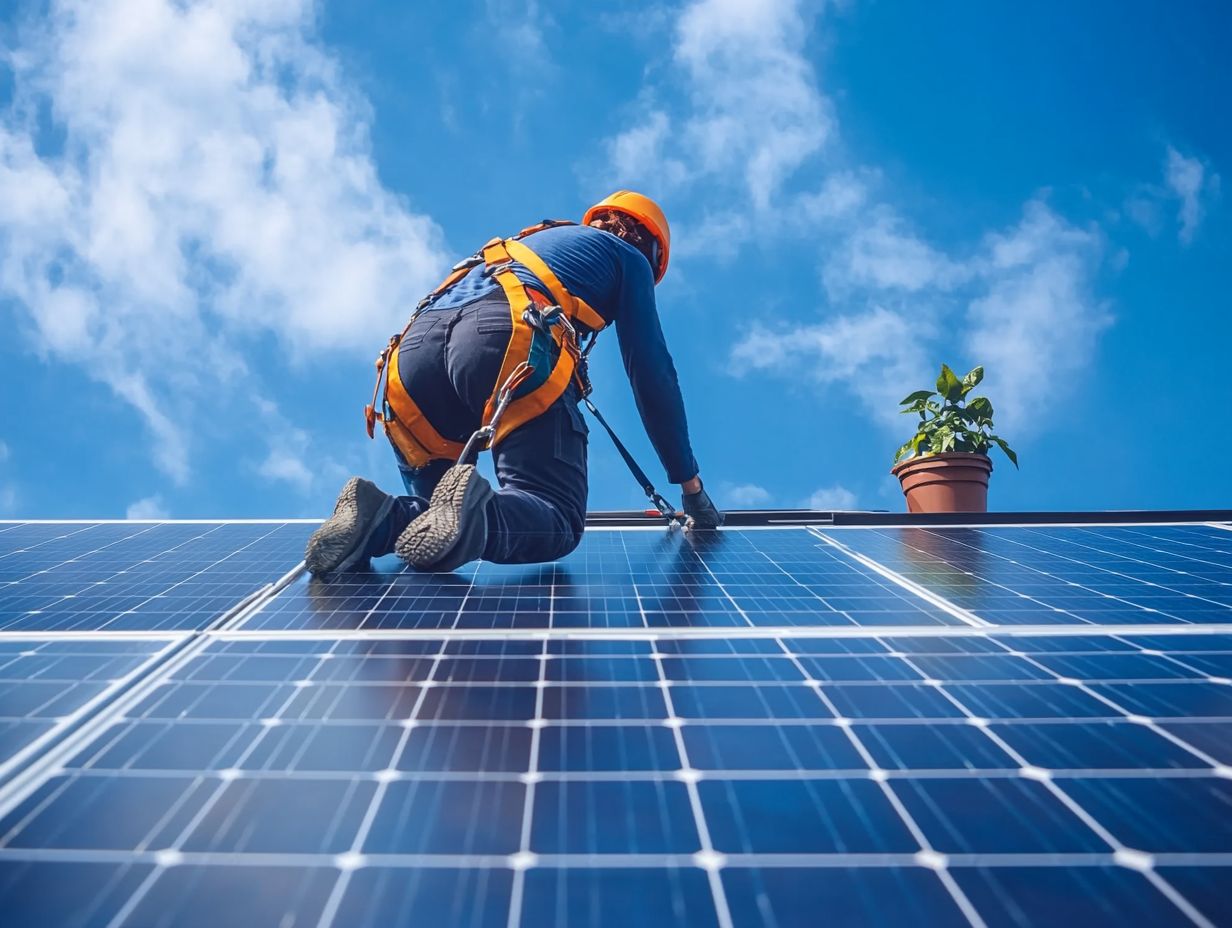
Regular cleaning and inspections of your solar energy system are essential for peak performance and safety. Neglecting these tasks can significantly drop your energy output.
Dirt and debris block sunlight, reducing efficiency. Aim for bi-annual cleanings and thorough inspections to catch potential issues early.
Dirty panels not only reduce energy production but also create safety hazards. Prioritizing cleanliness and checks ensures your system harnesses the sun’s energy effectively.
Handling Repairs and Replacements
Managing repairs and replacements is vital for keeping your solar energy system running smoothly. Address performance issues quickly to avoid costly downtime.
This strategy maximizes efficiency and extends the system’s lifespan. Common issues to watch for include:
- Inverter failures
- Wiring damage
- Old or damaged panels
Ensure that installation is done carefully to prevent these problems. Choose experienced solar professionals for the job.
Licensed solar installation companies have the expertise to spot potential issues early and provide effective solutions. Safeguard your investment and enhance its performance.
Maximizing Efficiency
Maximizing your solar energy system’s efficiency is key to boosting energy production. This way, you fully capitalize on your solar investment.
Tips for Optimizing Your Solar Energy System
To optimize your system, implement strategies that enhance energy efficiency. This ensures maximum returns on your investment.
Regularly monitor energy production to spot any discrepancies. Keeping an eye on output helps you make informed adjustments.
Adjusting settings with the seasons can greatly improve efficiency. Investing in real-time monitoring technology offers insights for proactive maintenance.
These strategies will support long-term efficiency and maximize the benefits of solar energy.
Dealing with Potential Issues
Managing potential issues is crucial for safety and performance. Be aware of common problems that may arise.
Staying informed enables you to address challenges quickly, protecting your investment and improving energy efficiency.
Common Problems and Solutions
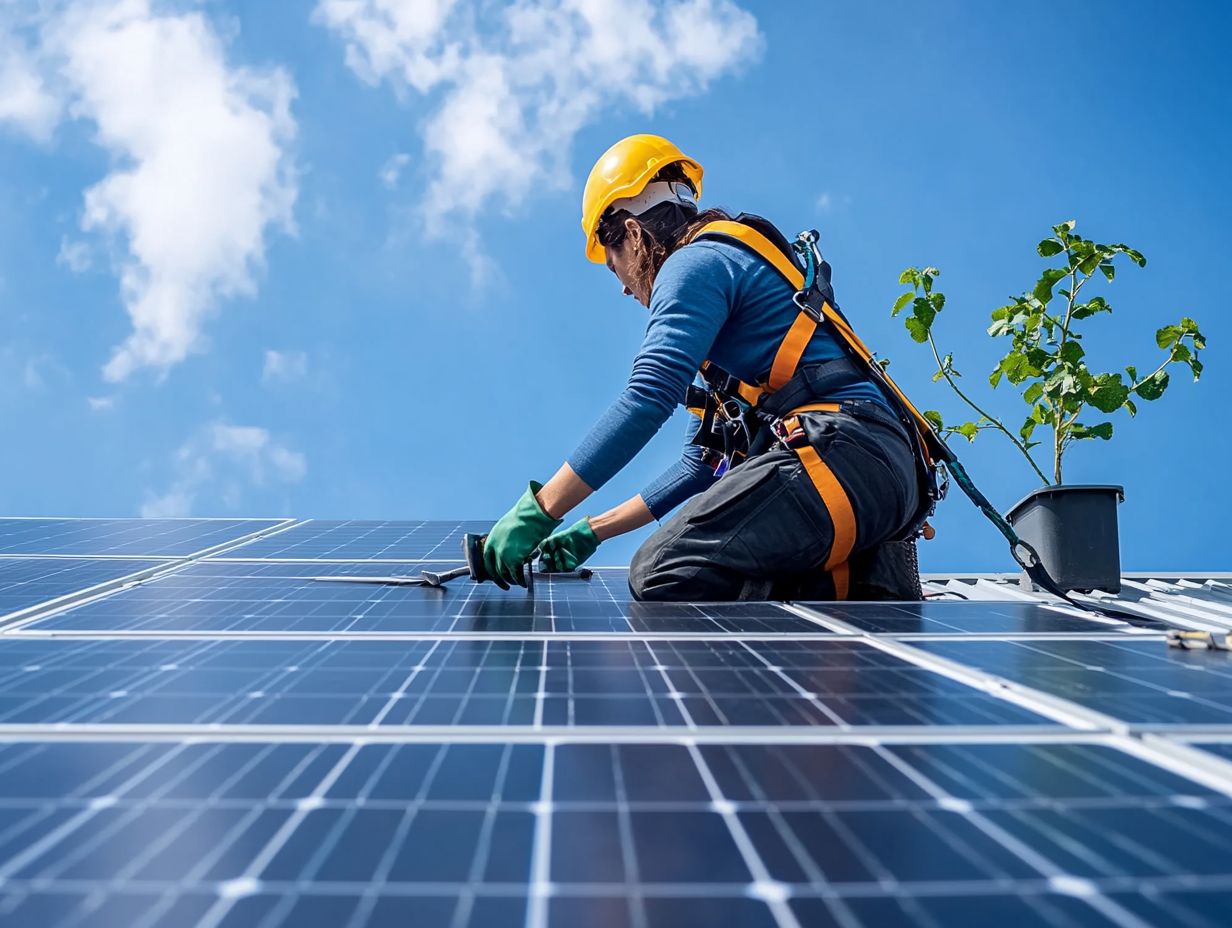
Common issues with solar systems often involve panel performance. Fortunately, many problems can be resolved with regular maintenance.
Poor performance can result from dirt, shading from trees, or inverter issues. Regular inspections and cleanings ensure panels absorb sunlight effectively.
Timely checks on the inverter and wiring prevent failures while improving energy conversion efficiency. When you detect problems early, you can take corrective actions.
Being proactive is essential for lasting performance and reliability in your solar system.
Ensuring Long-Term Performance
To ensure the long-term performance of your solar energy system, it s essential to adopt effective maintenance strategies. These strategies not only enhance performance and safety but also optimize your overall user experience.
By prioritizing these approaches, you can maximize your investment’s benefits and enjoy peace of mind with a well-maintained system.
Long-Term Maintenance Strategies
Adopting long-term maintenance strategies for your solar energy system is crucial for sustaining performance and ensuring the longevity of your investment.
Regular check-ups and timely cleaning are key to addressing potential issues before they escalate into costly repairs. Establishing a comprehensive maintenance schedule enables thorough evaluations of all components.
This proactive approach helps you identify wear and tear early, making necessary adjustments to enhance overall performance. Regularly cleaning your solar panels not only improves energy absorption but also extends the system’s lifespan.
Prioritizing these maintenance practices safeguards your investment and maximizes energy production over time. Act now to keep your solar energy system running efficiently!
Frequently Asked Questions
1. How do I know if my solar energy system needs maintenance?
It is recommended to have your solar energy system inspected at least once a year to ensure it s functioning properly. Signs that your system may need maintenance include a decrease in energy production, visible damage, or error messages on your inverter.
2. What type of maintenance is required for a solar energy system?
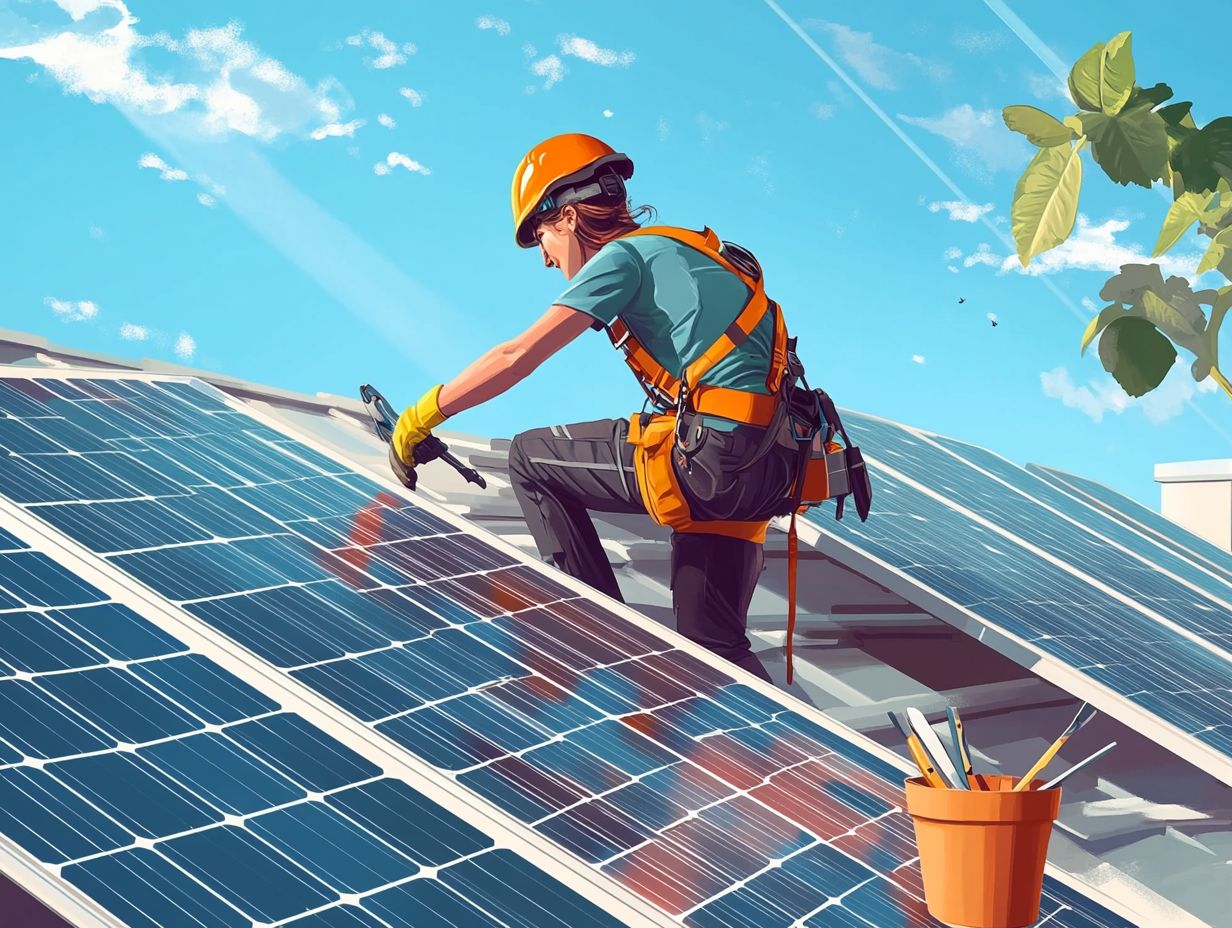
The most important task is keeping the panels clean and free of debris. You can do this with a gentle cleaning solution and a soft brush. It’s also important to check and tighten any loose connections and inspect for any damage to the system.
3. Can I perform maintenance on my solar energy system myself?
While some tasks, like cleaning the panels, can be done by homeowners, it’s best to have a professional solar technician perform regular maintenance and inspections. They have the knowledge and experience to identify and address potential issues with the system.
4. How long does a solar energy system typically last?
A well-kept solar energy system can last 25 to 30 years. However, regular checks and maintenance are essential for ensuring it functions properly and to extend its lifespan.
5. Can extreme weather affect my solar energy system?
Most solar energy systems are designed to withstand harsh weather conditions. However, extreme weather events like hailstorms or hurricanes can damage the panels or other components. It s important to have your system inspected after severe weather to ensure it s still functioning properly.
6. Are there any warranties for solar energy systems?
Yes, most solar energy systems come with warranties for both the panels and the inverter. These warranties typically range from 10 to 25 years, depending on the manufacturer. Be sure to read and understand the warranty terms to ensure proper coverage in case of issues with your system.
Ready to ensure your solar energy system stays in top shape? Schedule a maintenance checkup today!


